Life Line Screening compensated FOF with an advertising sponsorship to write this post. Regardless, I started having its health screenings years before this, and I only recommend products or services that I believe will benefit others. Geri Brin, Founder, faboverfifty.com
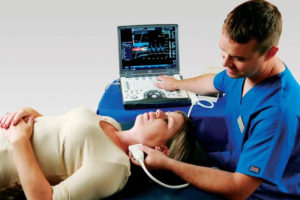
I wasn’t overly concerned when the ultrasound test from Life Line Screening revealed mild fatty plaque in the carotid artery on the right side of my neck. Two carotid arteries–there’s another one on the left side–carry oxygenated blood to the brain, neck and face, but the amount of plaque wasn’t a dire threat to my health, at least not immediately. Uncharacteristically, I dismissed the report recommendation to follow up with my doctor, too preoccupied with launching this website at the time. That was in 2010. I felt good and had no signs of a problem. My weight was reasonable. I exercised. Didn’t smoke or drink.
My blasé attitude had troubling consequences.
By last year, my weight had spun out of control, I was working out less, and a new ultrasound showed a dramatic increase in the plaque. Now the bad stuff was narrowing the right carotid artery somewhere between 59 and 80 percent. That got my attention, even if there wasn’t a single symptom. If a piece of plaque broke off and blocked the blood flow, I could have a stroke. To make matters worse, my cholesterol numbers were dismal. My doctor started me on statin therapy right away to lower my cholesterol, told me to lose weight, and to take low-dose baby aspirin every day.
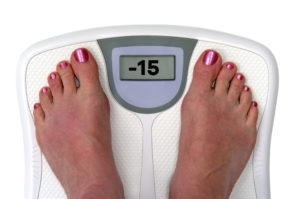 I’m 15 pounds lighter today and my cholesterol numbers are excellent, thanks to statins. Another carotid artery scan is scheduled for the end of July, and hopefully the level of plaque hasn’t progressed. “It might even have regressed,” my doctor said. If more plaque shows up, surgery might be necessary to clear it out. Serious surgery!
I’m 15 pounds lighter today and my cholesterol numbers are excellent, thanks to statins. Another carotid artery scan is scheduled for the end of July, and hopefully the level of plaque hasn’t progressed. “It might even have regressed,” my doctor said. If more plaque shows up, surgery might be necessary to clear it out. Serious surgery!
Ironically, most doctors won’t recommend a carotid artery ultrasound for asymptomatic patients with no family history of stroke. What’s more, Medicare doesn’t cover the test unless someone has experienced symptoms such as transient ischemic attacks, mini strokes lasting only a few minutes. Without coverage, it’s costly to have tests like this done at a hospital. The United States health system isn’t a shining example of how to practice preventive medicine.
Having no reason to suspect any cardiovascular problems nine years ago, I actually arranged for the first ultrasound through Life Line Screening as a preventive measure. Life Line has provided preventive screening to millions, and at remarkably fair fees, since it began 25 years ago. When the original results showed mild plaque, it should have been fair warning not to let myself go. After all, that’s what preventive health care means. That’s what makes Life Line a smart idea.
The Life Line Screening Difference
When Life Line recently contacted me about introducing its screening service to my FOFriends, I didn’t hesitate. After all, they discovered the plaque in my carotid artery at an early stage, not to mention early bone loss, and suggested that I see my own doctor. Pretty foolish not to heed their advice. “Every day we find people across the country with significant carotid artery disease,” said Dr. Keith Coffee, Chief Medical Officer at Life Line.
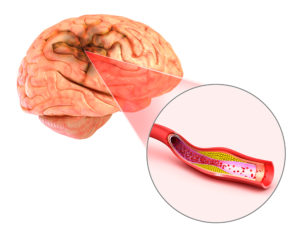
Besides the carotid artery screening for plaque, a Life Line special package offers tests for 1) Peripheral arterial disease, a circulatory condition in which blood vessels narrowed by plaque reduce blood flow to the limbs. P.A.D. usually affects the arteries in the legs, but it also can affect the arteries that carry blood from your heart to your head, arms, kidneys, and stomach 2) Abdominal aortic aneurysm, a bulging, weakened area in the wall of the aorta, which is the largest artery in the body. Over time, the blood vessel balloons and is at risk for bursting or tearing, which can cause life- threatening bleeding and potentially death. 3) Heart rhythm aka atrial fibrillation or AFib, a quivering or irregular heartbeat that can lead to blood clots, stroke, heart failure and other heart-related complications and 4) Osteoporosis, a loss of bone density or mass.
It’s only $159 for all five screenings.
“We discovered about 62K overall health risks in 2017 alone,” Dr. Coffee said. A team of highly qualified, board-certified radiologists throughout the country, led by a vascular surgeon, reads all ultrasound images as well as the electrocardiograms for AFib.
“These are screenings, not diagnostic tests,” Dr. Coffee stressed. “We encourage patients to share their results with their doctors so they can together discuss the appropriate treatment, if necessary.” (Remember, that’s what I didn’t do!) Life Line doesn’t have physicians available who can discuss the test results with patients, and it doesn’t interact with patients’ physicians. They do provide a summary of the results that you can share with your doctor. “We simply provide the incentive for patients to take the right steps for their health,” Dr. Coffee noted.
If Life Line Screening discovers a life threatening condition, however, such as an aneurysm that’s about to rupture, it will send someone right to the ER and call for an ambulance if they wish. “Our customers tell us that we’ve possibly saved their lives. We get letters all the time from people who had no symptoms and thought they were just fine, but were at risk for having a large aneurysm about the rupture,” Dr. Coffee said.
In and Out In 90 Minutes Or Less
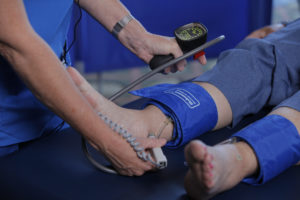
An average of 50 people a day check into each Life Line location in 60 cities across the country. Teams at the screening sites include at least two ultrasound stenographers who hold certificates in ultrasound technology, and two medical assistants who are cross trained to perform tests including electrocardiograms for heart rhythm, fingerstick blood tests, and peripheral pulses. A nurse practitioner joins most of the teams to see people 65+ years old for Annual Wellness Visits, which are covered under Medicare.
While most people opt for the basic, five-test package I described earlier, many decide to get their cholesterol and glucose checked during the same appointment, Dr. Coffee told me. Life Line Screening offers 15 preventive screening blood tests, including thyroid function, vitamin D, and hemoglobin A1C for diabetes. It also provides a take-home test for detection of colorectal cancer. A call center with 300 trained employees helps participants decide what tests are right for them, based on their age, risk factors and medical history.
![]() Testing is done in churches, at community centers, fraternal organizations and occasionally in hotel ballrooms. When Life Line works with affiliates, such as hospitals, anyone with abnormal results is referred back to the hospital. It also offers exclusive screenings for employees of large corporations as part of their healthcare plans. “Our goal is to get people in and out in 60 to 90 minutes, which includes paperwork and waiting time,” Dr. Coffee said.
Testing is done in churches, at community centers, fraternal organizations and occasionally in hotel ballrooms. When Life Line works with affiliates, such as hospitals, anyone with abnormal results is referred back to the hospital. It also offers exclusive screenings for employees of large corporations as part of their healthcare plans. “Our goal is to get people in and out in 60 to 90 minutes, which includes paperwork and waiting time,” Dr. Coffee said.
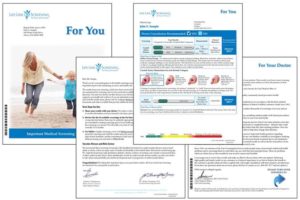
A results package arrives in the mail about three weeks after your screening. It reports on every test you took and on your risk for stroke and cardiovascular disease in general, taking into account factors including smoking, high cholesterol and family history. “We give you all the information we can to help you make lifestyle changes and modifications if you need to,” Dr. Coffee explained. If a major issue such as Afib is discovered, a Life Line representative will call you directly, rather than having you wait for the results package.
People generally have their first Life Line screenings at 55 years old. “We have patients in their 40s who just want to know where they fit healthwise, or maybe they have a family history of early strokes. And, we have people in their 90s,” Dr. Coffee said. Returning patients account for about half of Life Line’s annual screenings, and close to 90 percent of all patients have their own physicians.
Please learn from my error: Get preventive screenings once you’re in your mid-fifties, whether or not you have symptoms. And pay attention to what you learn.


